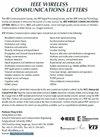可重构智能曲面辅助空中计算中的联合学习
IF 5.5
3区 计算机科学
Q1 COMPUTER SCIENCE, INFORMATION SYSTEMS
引用次数: 0
摘要
在这封信中,我们研究了利用可重构智能表面(RIS)进行空中联合学习(FL)的相移和波束成形向量联合设计方案。众所周知,参与空中联合学习的边缘设备越多,在无差错无线信道上的学习性能就越好。然而,当信道条件较差的设备参与空中计算(AirComp)系统内的学习时,FL 性能可能会下降。因此,我们提出了一种波束成形矢量和 RIS 相移设计算法,它能在聚合误差约束条件下最大化参与设备的数量。我们首先将传统问题重新表述为稀疏优化问题,并应用交替优化(AO)方法。然后,我们利用大化最小化(MM)方法和投影子梯度法提出了一种低复杂度算法。仿真结果表明,RIS 有助于在 AirComp FL 中容纳更多设备,而且所提出的算法达到了接近理想 FL 系统的性能。本文章由计算机程序翻译,如有差异,请以英文原文为准。
Reconfigurable Intelligent Surfaces-Aided Federated Learning in Over-the-Air Computation
In this letter, we investigate a joint design scheme of phase shifts and a beamforming vector in over-the-air federated learning (FL) with a reconfigurable intelligent surface (RIS). It is well known that the more edge devices participate in FL the better the learning performance over error-free wireless channels. However, the FL performance can be degraded when devices with poor channel conditions participate in the learning within the over-the-air computation (AirComp) system. Therefore, we present a beamforming vector and RIS phase-shift design algorithm that maximizes the number of participating devices under the aggregation error constraint. We first reformulate the conventional problem to a sparse optimization problem and apply the alternating optimization (AO) approach. Then, we propose a low-complexity algorithm using the majorization minimization (MM) approach and the projected subgradient method. Simulation results demonstrate that RIS helps to accommodate more devices in AirComp FL and the proposed algorithms achieve performance close to that of an ideal FL system.
求助全文
通过发布文献求助,成功后即可免费获取论文全文。
去求助
来源期刊

IEEE Wireless Communications Letters
Engineering-Electrical and Electronic Engineering
CiteScore
12.30
自引率
6.30%
发文量
481
期刊介绍:
IEEE Wireless Communications Letters publishes short papers in a rapid publication cycle on advances in the state-of-the-art of wireless communications. Both theoretical contributions (including new techniques, concepts, and analyses) and practical contributions (including system experiments and prototypes, and new applications) are encouraged. This journal focuses on the physical layer and the link layer of wireless communication systems.
 求助内容:
求助内容: 应助结果提醒方式:
应助结果提醒方式:


